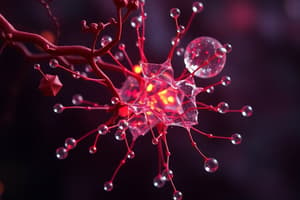Podcast
Questions and Answers
What is the primary focus of physical sciences?
What is the primary focus of physical sciences?
- Study of computation and information processing
- Study of living organisms
- Study of the Earth’s structure
- Study of matter, energy, and their interactions (correct)
Which branch of science focuses on heredity and variation in organisms?
Which branch of science focuses on heredity and variation in organisms?
- Genetics (correct)
- Biology
- Chemistry
- Meteorology
In the scientific method, what is the step following hypothesis formulation?
In the scientific method, what is the step following hypothesis formulation?
- Experimentation (correct)
- Communication
- Research
- Observation
What is a control group in an experiment?
What is a control group in an experiment?
Which of the following is true about a scientific theory?
Which of the following is true about a scientific theory?
Which of the following best defines a dependent variable in an experiment?
Which of the following best defines a dependent variable in an experiment?
Which of the following is NOT a key concept in science?
Which of the following is NOT a key concept in science?
What is the purpose of communicating findings in science?
What is the purpose of communicating findings in science?
Which area of science studies atmospheric phenomena?
Which area of science studies atmospheric phenomena?
What role does science play in public health decision-making?
What role does science play in public health decision-making?
Flashcards are hidden until you start studying
Study Notes
Definition of Science
- Systematic study of the natural world.
- Based on observation, experimentation, and evidence.
Branches of Science
-
Physical Sciences
- Physics: Study of matter, energy, and their interactions.
- Chemistry: Study of substances, their properties, and reactions.
- Astronomy: Study of celestial bodies and the universe.
-
Life Sciences
- Biology: Study of living organisms and their interactions.
- Ecology: Study of ecosystems and environmental interactions.
- Genetics: Study of heredity and variation in organisms.
-
Earth Sciences
- Geology: Study of the Earth’s structure, processes, and history.
- Meteorology: Study of weather and atmospheric phenomena.
- Oceanography: Study of oceans and marine systems.
-
Formal Sciences
- Mathematics: Study of numbers, quantities, and shapes.
- Logic: Study of reasoning and argumentation.
- Computer Science: Study of computation and information processing.
Scientific Method
- Observation: Identifying a phenomenon or problem.
- Research: Gathering existing information.
- Hypothesis: Formulating a testable explanation.
- Experimentation: Testing the hypothesis through controlled experiments.
- Analysis: Interpreting data and results.
- Conclusion: Drawing conclusions based on experimental evidence.
- Communication: Sharing findings with the scientific community.
Key Concepts in Science
- Theory: A well-substantiated explanation of an aspect of the natural world.
- Law: A statement based on repeated experimental observations that describes some aspect of the universe.
- Variable: Any factor that can change in an experiment.
- Independent Variable: The factor that is manipulated.
- Dependent Variable: The factor that is measured.
- Control Group: The group that does not receive the experimental treatment for comparison.
Importance of Science
- Advances understanding of the natural world.
- Drives technological innovation and development.
- Informs policy-making and public health decisions.
- Enhances critical thinking and problem-solving skills.
Definition of Science
- Science is a systematic study of the natural world.
- It relies on observation, experimentation, and evidence to draw conclusions.
Branches of Science
-
Physical Sciences:
- Physics explores matter, energy, and their interactions.
- Chemistry focuses on substances, their properties, and chemical reactions.
- Astronomy studies celestial bodies and the universe.
-
Life Sciences:
- Biology investigates living organisms and their relationships.
- Ecology examines ecosystems and interactions with the environment.
- Genetics studies heredity and variations in organisms.
-
Earth Sciences:
- Geology analyzes the Earth’s structure, processes, and historical changes.
- Meteorology concerns itself with weather patterns and atmospheric conditions.
- Oceanography studies oceans and marine ecosystems.
-
Formal Sciences:
- Mathematics deals with numbers, quantities, and shapes.
- Logic focuses on reasoning and the structure of arguments.
- Computer Science centers on computation and information processing.
Scientific Method
- Observation: Identifying a problem or phenomenon to study.
- Research: Collecting existing information related to the problem.
- Hypothesis: Creating a testable explanation for the observation.
- Experimentation: Conducting controlled tests to evaluate the hypothesis.
- Analysis: Interpreting the collected data and results from experiments.
- Conclusion: Drawing conclusions based on the evidence obtained.
- Communication: Sharing findings with the scientific community for validation.
Key Concepts in Science
- Theory: A robust explanation supported by substantial evidence regarding a natural phenomenon.
- Law: A concise statement derived from repeated observations that describes an aspect of the universe.
- Variable: Any element that can change during an experiment.
- Independent Variable: The factor deliberately manipulated in an experiment.
- Dependent Variable: The factor measured to assess the impact of the independent variable.
- Control Group: A baseline group that does not undergo experimental changes for comparison.
Importance of Science
- Expands knowledge of the natural world and its phenomena.
- Fuels innovation and advances in technology.
- Provides essential insights for policymaking and public health strategies.
- Cultivates critical thinking and enhances problem-solving capabilities.
Studying That Suits You
Use AI to generate personalized quizzes and flashcards to suit your learning preferences.




